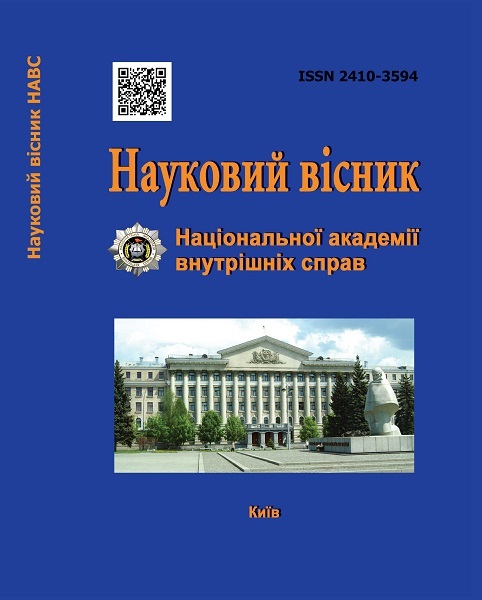Іnnovative Approaches to Criminalistics Teaching in Higher Educational Establishments under Ministry of Internal Affairs of Ukraine
Abstract
The purpose of the article is to define the innovative approaches to criminalistics teaching in higher educational es-tablishments under Ministry of Internal Affairs of Ukraine. Меthodology. Меthodological tools are selected with consid-eration of the established aim, specificity of research object and subject. System of scientific cognition methods was used, respectively the methods of formal logic (аnalysis, synthesis, deduction, induction, analogy, abstracting) – with aim to identify the matter of defined issues; theoretical – to analyze publications on the topic; empirical – in the course of experimental research and interviewing of teachers and students/cadets; pedagogical modeling – to study the pedagogi-cal objects by modeling its specific characteristics; method of systemic analysis – in the context of identification of ways to implement the innovative approaches to criminalistics teaching in higher educational establishments under Ministry of Internal Affairs of Ukraine. Scientific novelty is justified with the establishment of new tools to be used in the process of crime combating. Innovative approaches are required to solve the defined problems. One of the important elements is successful mastering of «Criminalistics» subject by future law enforcement in higher educational establishments under Ministry of Internal Affairs of Ukraine with use of innovative educational technologies. Conclusions. Currently in the system of higher educational establishments under Ministry of Internal Affairs of Ukraine new educational technologies are developed and implemented along with improvement of content and methods of the subject delivery. Priority is given to enhancement of practical component during the training process: binary sessions, tactical and special training with participation National Police of Ukraine staff, Ministry of Internal Affairs of Ukraine; use of interactive training grounds; use of «police quest» format and internship sessions in practical units; use of electronic training equipment (multimedia manuals and textbooks, automatized working places, computer simulators for investigation of specific crime types etc.) it is important for students and cadets to advance their skills in forensic equipment application, modern software, database management. Forensic subjects mastering depends also on individual teacher’s characteristics whose task is not only to transfer knowledge and skills but present innovative forms, methods and means of training.
Кeywords: іnnovation; educational process; criminalistics; higher educational establishment; Ministry of Internal Affairs; National Police; forensic training; law enforcement activity.
Downloads
Abstract views: 270 PDF Downloads: 249
- Authors reserve the right to authorship of their own work and transfer to the magazine the right of the first publication of this work under the terms of the Creative Commons Attribution License, which allows other persons to freely distribute published work with mandatory reference to authors of the original work and the first publication of an article in this magazine.
- Authors have the right to enter into separate additional agreements on non-exclusive dissemination of the work in the form in which it was published in the journal (for example, to post an article in the institution's repository or to publish as part of a monograph), provided that the link to the first publication of the work in this journal is maintained.
- The journal's policy allows and encourages the posting of articles by authors on the Internet (for example, in electronic storehouses of institutions or on personal websites), both before the submission of this manuscript to the editorial office and during its editorial processing, as this contributes to the creation of a productive scientific discussion and positively affects the efficiency and dynamics of citing the published work.




